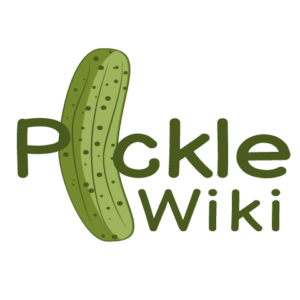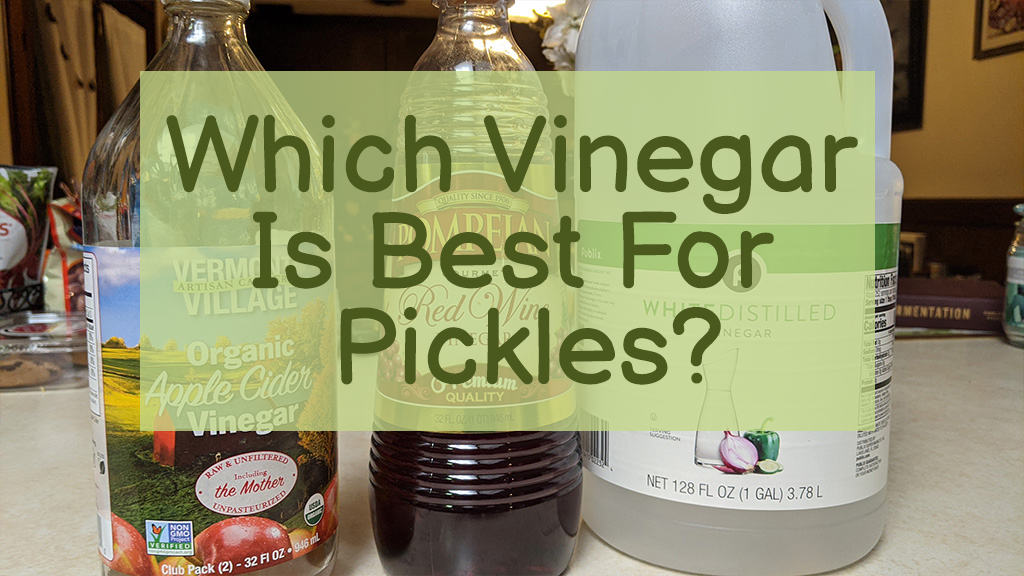After the harvest, pickling vegetables is a necessary process that has been taking place for centuries and has helped humans thrive during long and arduous winters. Pickling can be done with salt, but vinegar is the most often used method in the Western world. What kind of vinegar is best for pickling?
The vinegar you choose should have 5% acidity and be flavored towards whatever you are trying to pickle. Acidity is going to be the key to the entire process. The taste is going to be the second biggest determining factor when choosing. It can tint the color of the vegetables being pickled and have some astounding effects on the food.
White vinegar is the most often used vinegar but knowing what the others can bring to the table while pickling can only improve your variety and palette. Be warned that trying the different types of vinegar will take time and could mean ruined food. Take a deep breath and read on to learn everything you need to know about choosing the best vinegar for pickling.
Best Kinds of Vinegar for Pickling
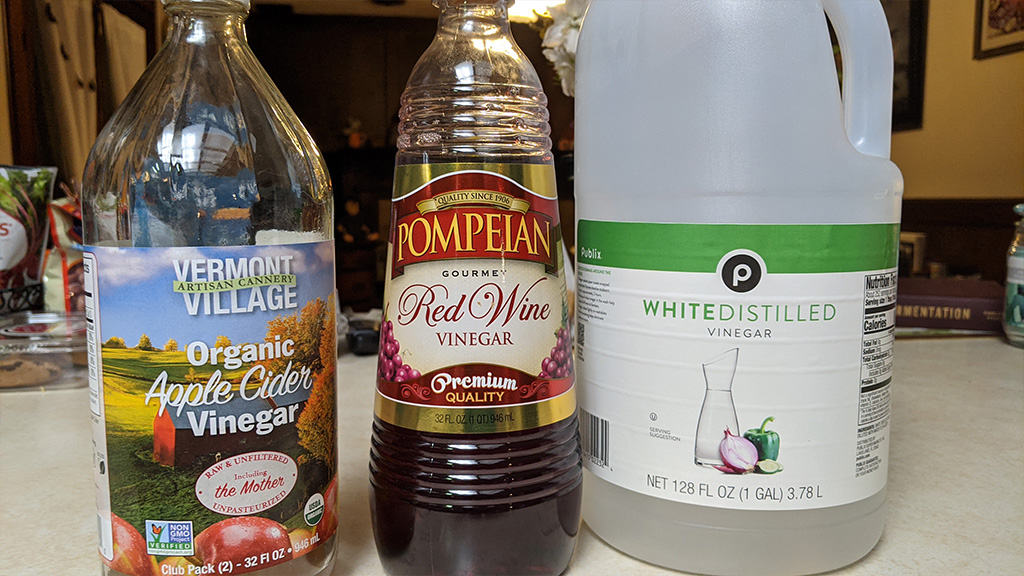
It should be no secret that vinegar comes in different types, and each has its unique benefits and drawbacks. When choosing a vinegar, the most important thing is making sure that it has more than 5% acidity. This acid level should be clearly labeled on the bottle’s side, and if it is not, don’t use it. Weak acid just makes wet veggies instead of crisp. Be mindful of water content.
The types of vinegar used in pickling are:
- Distilled White Vinegar
- Malt Vinegar
- Cider Vinegar
- Wine Vinegar
Vinegar is going to induce its flavor into the vegetables that you are preserving. Distilled white vinegar flavoring is so mild that it fades away during the process, leaving a crisp veggie that retains its taste, which is familiar and comforting. The flavor could get old after a few jars, and creating your recipe for a particular type of food could hit the spot.
Which Vinegar Works Best for You?
Choosing vinegar is going to take some time and tasting. Some specific recipes and mixtures produce certain flavors for each type of pickling agent. It is important to remember that pickles aren’t the only food that comes from the pickling process. Other delicacies from around the country can also be made by pickling veggies in a particular way.
The easiest way to choose vinegar is to:
- Choose a vinegar for preservation – If your goal is to preserve the vegetables for as long as needed, you should choose something that doesn’t have an overpowering acid level and won’t turn food the color of ruin. A light-colored vinegar is going to be your best bet in this situation as they are made from grains that leave no taste behind.
- Choose a vinegar for consumption – It takes a while to prepare a pickling solution. Even longer if you have vegetables that must soak. If you will be making a solitary dish from a pickle brine, it must be something that has a pronounced taste and won’t be diluted by water from the material.
Distilled White Vinegar and its Uses
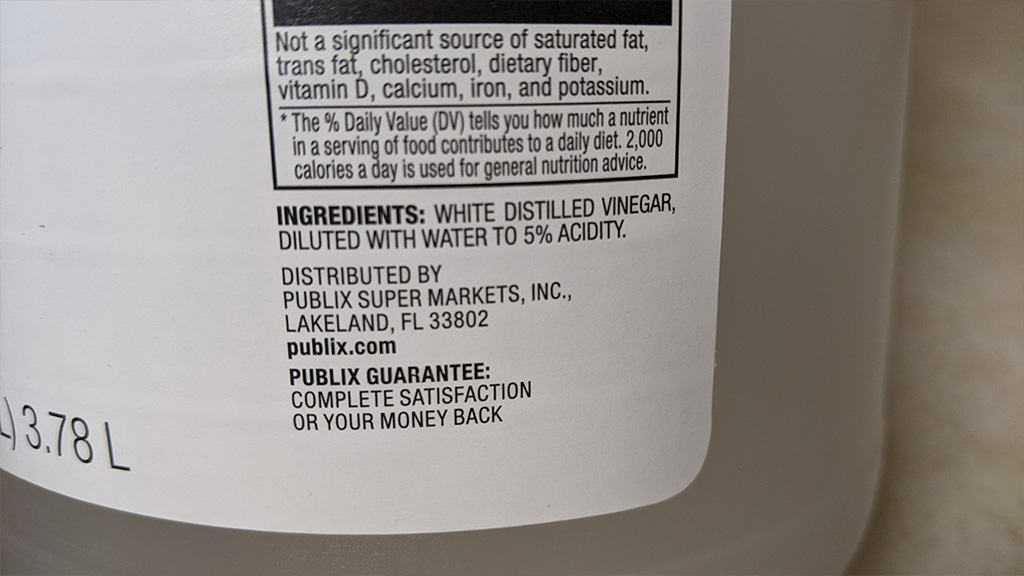
When it comes to making pickles, the most preferred acid to use will be distilled white vinegar. It is cheap, and its recipe cooks most of the vinegar flavoring out. Another great thing about using distilled white vinegar is that it doesn’t leave a tint on the food. It is a clear liquid that can be bought in the baking aisle of any grocery store.
The benefits of using distilled white vinegar while pickling are:
- Inexpensive and available – White vinegar will be found at almost any grocery store or supermarket baking aisle. It is also much less expensive than the other vinegar on the list. It is made from fermented grains, which means that the materials needed to make white distilled vinegar are also readily available.
- Won’t cloud taste – It can’t be stressed enough how much a vinegar changes the taste of the vegetable you are working with. Some people will not adapt to a new flavor in their diet and could avoid foods. With white distilled vinegar, the taste remains while keeping the food crisp and preserved.
- Can be made at home – A big thing about vinegar is that it is an easy DIY job that most anyone can tackle. When you pair that with the pickling process, you are using and reusing food that can last beyond the winter. It also piggybacks on the low-cost concept by making use of materials that have already been paid for.
The best brands of white distilled vinegar are:
- Lucy’s Family Owned
- Heinz Distilled White Vinegar
- Acclaim All Natural
- Woeber’s 5 Percent
Lucy’s Family Owned
Pickling is just one of the many things that distilled white vinegar can do while cooking. Lucy’s Family Owned is one of the best vinegar’s on the market because it doesn’t have any added preservatives. That means the pickled food will taste great and be great for you! During the winter months, it is essential to keep your diet diverse for lack of sunshine.
Heinz Distilled White Vinegar
Heinz is most well known for making mustard and ketchup, but they have an excellent distilled white vinegar as well. It can be found in every grocery store across the country and will often come with a competitor’s discount. That means if you find a better brand cheaper, they will match the price via a refund or rebate. Heinz makes an excellent low-cost product.
Acclaim All Natural
Acclaim is an excellent company that plays up the many uses for distilled white vinegar. If people aren’t using white distilled vinegar to make delicious pickles, then it is an additive for a cleaning agent that rivals any other on the market. It creates a clean smell that some people prefer over the acidic odors left behind by bleach-based cleaners.
Woeber’s Five Percent
Woeber’s is a company that isn’t so well known but makes an excellent product to be used in pickling. It comes in gallon jugs, which makes it inexpensive to pickle several different types of vegetables. Woeber’s is also an utterly Vegan product that has little to no impact on the environment or food chain.
Malt Vinegar: An English Delicacy Made in America
One of the main things that are pickled with malt vinegar is onions. In England, pickled onions are a side dish that can be used at most any dinner. In the States, the malt is used to give fried fish and french fries a tart dipping sauce. Malt vinegar is made from nutty grains and gives off a caramel type flavor. It also has a brown hue that will tent the food a brown color.
The benefits of using malt vinegar when pickling are:
- Tart flavor is a nice change – Pickles made from cucumbers are one of the most common vegetables used during the pickling process. Using malt vinegar gives the acidic bite of a regular pickle a strong tart flavor that is a different palette change and provides the diet with variety.
- Brining with malt vinegar – Another way to make pickles is to use them in a brine. Brine is just like the pickling process but with less salt. That means that if you are looking for a healthier option for your pickles, then using malt vinegar means less sodium creeps into your diet.
- Created with barley – Barley is a grain that is found in most beers and ales. The brewing process is very similar to what occurs during pickling. It has a distinct taste that transfers over to the pickling process. Barley is readily available and can be grown onsite to produce a pickling solution that costs nothing but can feed the family through an entire season if done correctly.
The best brands of malt vinegar are:
- Heinz English Style Malt Vinegar
- Reese London Pub Malt Vinegar
- Sarsons Malt Vinegar
- Soeos Chinkiang Vinegar
Heinz English Style Malt Vinegar
Heinz makes some of the most well-known condiments in the United States. They are also one of the only companies that make the English delicacy of malt vinegar. It can be used in all sorts of dipping sauces and brines but works best with fish. Today there are fish restaurants around the country that still offer malted vinegar with fried fish baskets.
Reese London Pub Malt Vinegar
Malt vinegar is the king of pub foods in the UK. They use it to flavor fish and chips and make a pickled onion that is a staple of their diets. In the US, Reese London Pub is a favorite for people looking for a bit of British fare. When used in pickling, the Reese’s gives a dark color with a sweet flavor like caramel added to your pickles.
Sarsons Malt Vinegar
Sarsons make one of the most flavorful malt vinegar on the market. It has an extra tangy flavor that will add a noticeable tint to your veggies. Like the other listed vinegar, it will have a 5% acidity that makes it perfect for making pickles. You should know that Sarsons is made in the UK and only sells smaller bottles in the US.
Soeos Chinkiang Vinegar
One of the pickled foods that is always overlooked is kimchi. It is a salty mix of vegetables that comes from Korea. Kimchi is one of the most widely eaten foods in the northeast as people go crazy for Korean barbecue. The malted vinegar Chinkiang is something that could take some finding but can be ordered online with ease.
Cider Vinegar Not for Looks for Flavor
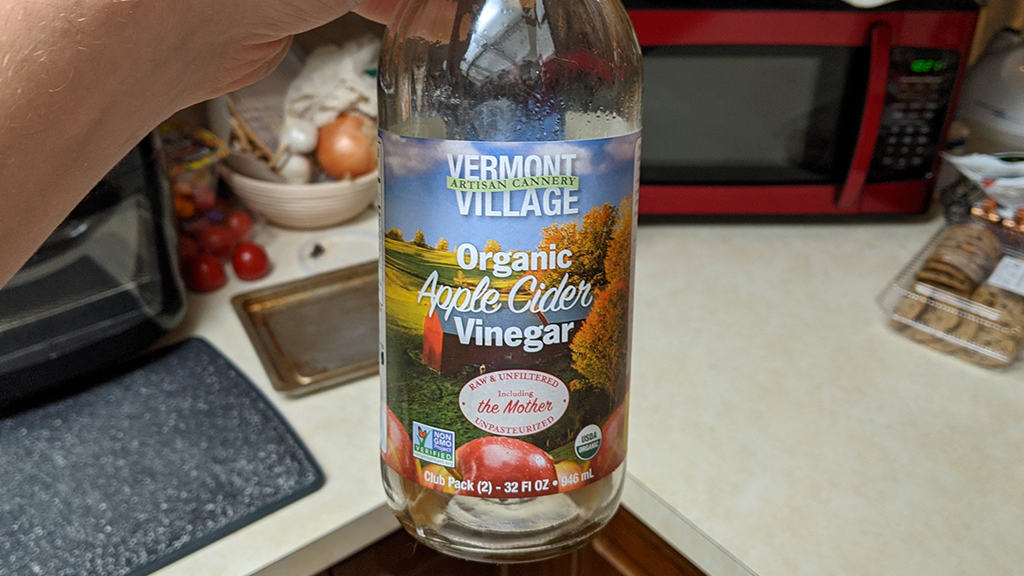
Cider vinegar, usually made from crushed apples, will turn whatever you are pickling a dark brown. This color change does signify a massive shift in taste for the veggie. For tasters who don’t like the typical pickle taste, this is what you need to have them try. It maintains the flavor of the vinegar and has the classic apple taste that everyone knows.
The benefits of cider vinegar are:
- Many health benefits – One of the hottest trends in health and fitness is adding cider vinegar as a morning cocktail. It is believed to be a natural diuretic that also aids in digestion. The FDAA does not back the claims about cider vinegar, and every person with serious health issues should consult a physician.
- Most flavorful of the kinds of vinegar – Cider vinegar is good because distilled white vinegar is chosen for lack of taste. The cider is selected for flavor. While it is an overpowering additive to your pickling brine, it will be too much for some people. The flavor has a drawback of turning every veggie the color or ruin.
The best cider kinds of vinegar are:
- Bragg Organic Apple Cider
- Lucy’s Family Owned
- Fairchild’s Organic Apple Cider
Bragg’s Organic Apple Cider
One of the most organically produced and environmentally friendly products around is Bragg’s Organic Apple Cider. It is made from organically grown apples and can be added to your diet as raw fluid or used to brine pickles and other vegetables. This unfiltered vinegar will bring out some intense apple flavors in your jars of pickles, be prepared.
Lucy’s Family Owned
Known for all types of vinegar concoctions, Lucy’s Family Owned has an excellent apple cider vinegar that will give a charge to all your pickle jars. It comes in a more massive jug, allowing you to bathe lots of freshly picked fruits and vegetables in the apple-flavored sweetness. Lucy’s is a small company that produces an amazingly tasty product suitable for any situation.
Fairchild’s Organic Apple Cider
One of the essential ingredients in cider is the Mother of Vinegar. It is pure vinegar that gives the acid content that is needed to pickle. Organic brands all have amounts of Mother of Vinegar in them, and it shows with the finished pickles.
Wine Vinegar and How it Pickles
There isn’t a more straightforward process than wine vinegar. Vinegar is just alcohol or wine that has gone bad. Using wine vinegar will produce an acidic bite that will mirror the wine’s flavor. For instance, the pickles from a red wine will have the grapes’ dry taste and maintain salt content.
The benefits of using wine vinegar are:
- More flavor with time – Like other wines, vinegar made from the wine will get better with age. If you have a two-year-old vinegar made from red wine, it will taste different from one made more recently. The same goes for white wine or any other wine that you choose to pickle with.
- Wide variety of ingredients – Vinegar, like wine, can be made from so many different things that provide a wide array of tastes. Using vinegar made from strawberry wine or sour grapes can add an interesting kick to your stored food. Choose off-setting flavors for times when your menu has become redundant. (Source: Food.com)
The best kinds of wine vinegar are:
- Pompeian Gourmet Organic Red Wine Vinegar
- Colavita Cabernet Red Wine Vinegar
- Colavita Aged White Wine Vinegar
Pompeian Gourmet Organic Red Wine Vinegar
This great red wine vinegar contains the mother and is made organically and environmentally friendly. Pompeian makes several different types of wine vinegar, and their organic red is the most popular. The company has its roots in olive oil and knows what it will take to produce a top-notch product every time.
Colavita Cabernet Red Wine Vinegar
Wine has a higher acidity rate than other vinegar because of the shorter creation process. The Colavita comes in at 7%, which leads to a more tart flavor of a pickle. They have tons of different kinds of vinegar that go up and down the flavor scale, but red wine is so typical in French homes that it is in almost half of all French dinner cuisine.
Colavita Aged White Wine Vinegar
Colavita produces such a strong product that two of their vinegar products are some of the top sellers. It crosses over with another great thing about wine vinegar, aging that produces a more robust flavor. It is also a non-GMO and environmentally friendly produced product. Colavita stands behind their products and makes a wide array of vinegar that is sure to spice up the meal.
Conclusion
Choosing a vinegar for pickling comes down to a matter of taste or preparation. If you are in for a more vegetable flavored treat, using distilled white vinegar is your best bet. As the need for different flavor arises, using apple cider vinegar or malt vinegar gives you other options for taste. Storing food works best with white distilled vinegar to retain flavor.
Trying the different types of vinegar will create several other food options for you and your family. Choose a recipe that isn’t full of processed items and relies on the organic goodness of natural foods. Not only will they preserve for longer, but they will also have an unrivaled taste. Keeping food organic means that it will last for much longer and be healthier.
